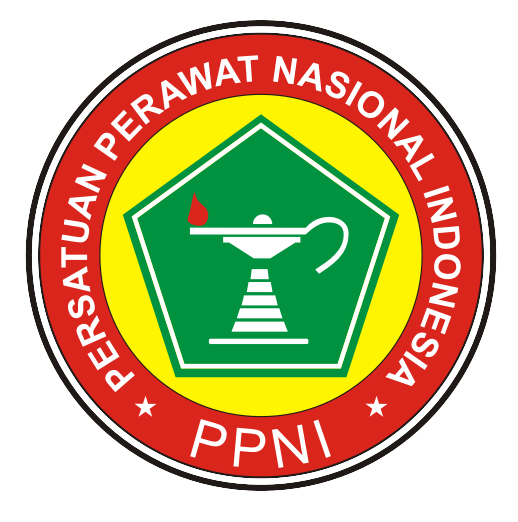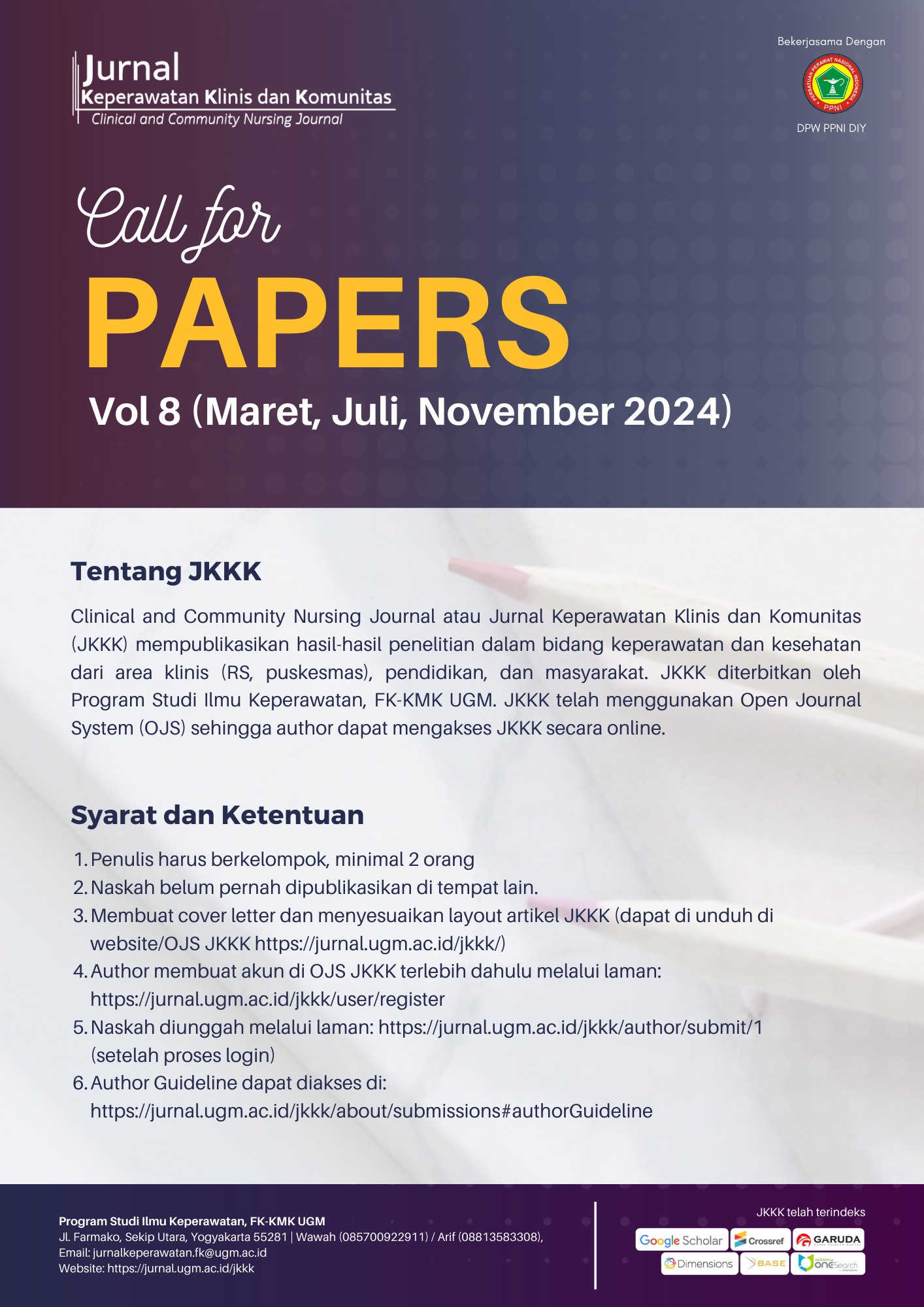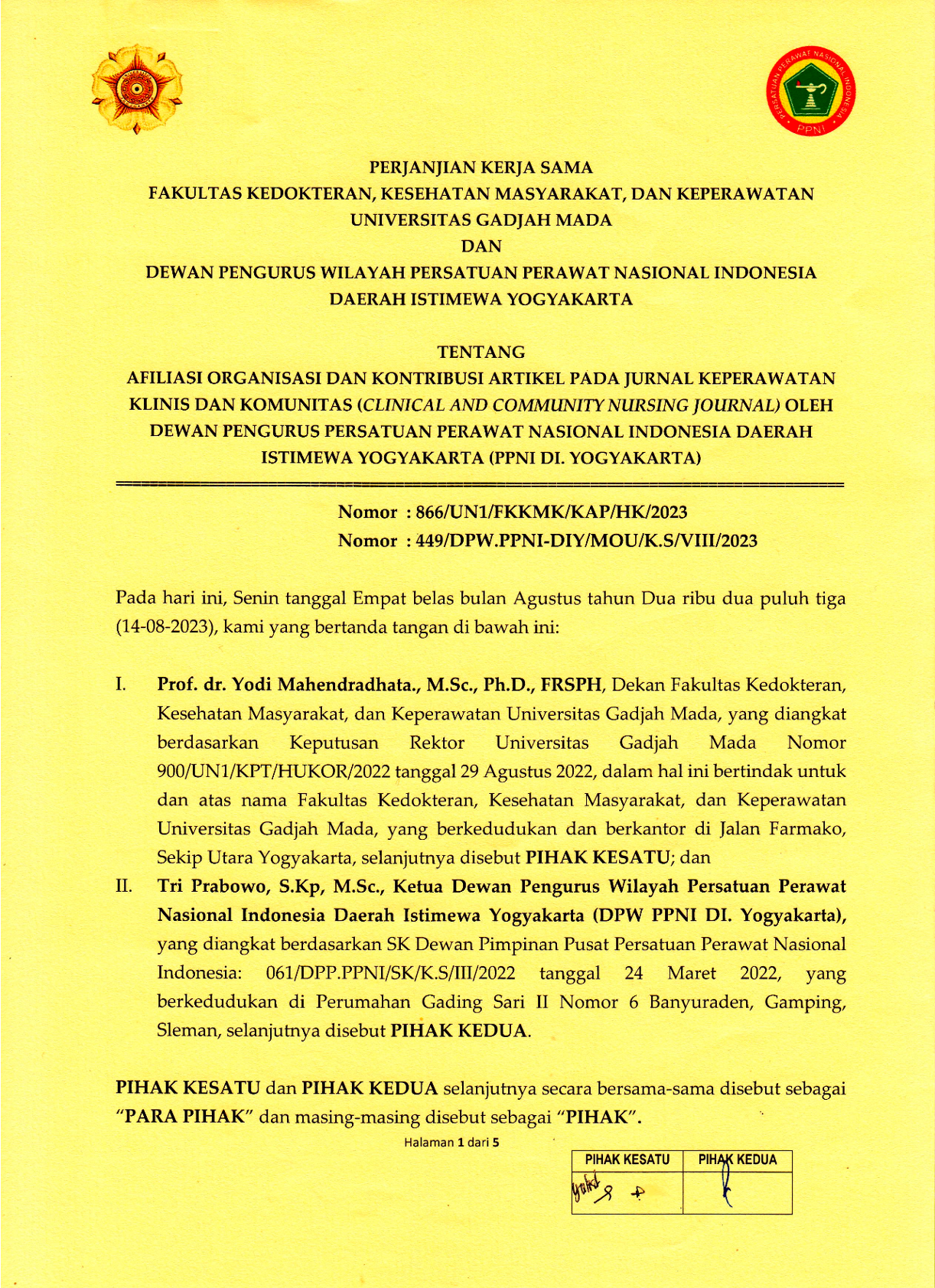Gambaran Dukungan Sosial Bagi Family Caregiver dalam Merawat Pasien Demensia
Putri Utami Ayu Maninggar(1), Christantie Effendy(2), Heny Suseani Pangastuti(3*)
(1) Program Studi Ilmu Keperawatan, Fakultas Kedokteran, Kesehatan Masyarakat, dan Keperawatan Universitas Gadjah Mada
(2) Departemen Keperawatan Medikal Bedah, Fakultas Kedokteran, Kesehatan Masyarakat, dan Keperawatan Universitas Gadjah Mada
(3) Departemen Keperawatan Medikal Bedah, Fakultas Kedokteran, Kesehatan Masyarakat, dan Keperawatan Universitas Gadjah Mada
(*) Corresponding Author
Abstract
Background: A family caregiver requires high social support to reduce stress levels and improve welfare in treating people with dementia. Research about social support for family caregiver in treating dementia has rarely been conducted.
Objective: To describe social support for family caregiver in treating dementia patients.
Method: This research was descriptive quantitative research and cross-sectional study design. Data was collected in May 2018. The samples in this study were 53 family caregivers of dementia patients who came to the Memory Clinic of Dr. Sardjito Hospital in Yogyakarta. Sampling technique was using purposive sampling. Social Support Questionnaire (SSQ) was equipped as research instrument, while data analysis was using univariate analysis.
Results: Respondents who received social support came from primary, secondary, and tertiary sources were 44 respondents (83%). The average value of emotional-support satisfaction level reached 4,85 (± 0,59), while instrumental support was 4.79 (± 0,64), esteem support was 4,79 (± 0,77), and informational support was 4,87 (± 0,57).
Conclusion: All forms of social support which were received by the family caregiver are close to category 5 (satisfied). Mostly, social support sources came from children, siblings, relatives, and health workers.
Latar belakang: Seorang family caregiver membutuhkan dukungan sosial yang tinggi dalam melakukan perawatan pada pasien demensia, untuk mengurangi tingkat stres dan meningkatkan kesejahteraan. Penelitian terkait gambaran dukungan sosial family caregiver dalam melakukan perawatan pada pasien demensia masih jarang dilakukan.
Tujuan: Untuk menggambarkan dukungan sosial yang diterima family caregiver dalam merawat pasien demensia.
Metode: Penelitian ini merupakan penelitian kuantitatif yang bersifat deskriptif, dengan rancangan penelitian cross sectional. Pengambilan data dilakukan pada bulan Mei 2018. Sampel dalam penelitian ini adalah 53 orang family caregiver pasien demensia yang datang ke Klinik Memori RSUP Dr. Sardjito Yogyakarta. Teknik pengambilan sampel menggunakan purposive sampling. Instrumen penelitian menggunakan Social Support Questionnaire (SSQ). Sedangkan analisis data menggunakan analisis univariat.
Hasil: Responden yang menerima dukungan sosial berasal dari sumber primer, sekunder, dan tersier, sebanyak 44 responden (83%). Rata-rata tingkat kepuasan dari dukungan emosional yang diterima responden sebesar 4,85 (± 0,59), dukungan instrumental sebesar 4,79 (± 0,64), dukungan penghargaan sebesar 4,79 (±0,77), dan dukungan informasional sebesar 4,87 (± 0,57).
Kesimpulan: Semua bentuk dukungan sosial yang diterima family caregiver bernilai mendekati kategori 5 (puas). Mayoritas sumber dukungan sosial berasal dari anak, kakak/adik, kerabat, dan petugas kesehatan.
Keywords
Full Text:
PDFReferences
- Alzheimer’s Australia. What is Dementia? 2016 [cited 2017 Sep 13]. Available from: https://www.fightdementia.org.au/files/helpsheets/Helpsheet-AboutDementia01-WhatIsDementia_english.pdf.
- Agronin, M. E. Alzheimer Disease and Other Dementias. 2nd Ed. Philadelphia: Lippincott Williams & Wilkins; 2008. 2 p.
- World Health Organization. The Epidemiology and Impact of Dementia Current State and Future Trends. (2015) [cited 2017 Feb 13]. Available from: http://www.who.int/mental_health/neurology/dementia/dementia_thematicbrief_epidemiology.pdf.
- Prince, Martin., Wimo, Anders., Guerchet, Maelenn., Ali, Gemma-Claire., Wu, Yu-Tzu., & Prina, Matthew. World Alzheimer Report 2015: The Global Impact of Dementia; An Analysis of Prevalence, Incidence, Cost, and Trends. London: Alzheimer’s Disease International, 2015.
- Prince M, Comas-Herrera A, Knapp M, Guerchet M, Karagiannidou M. World Alzheimer Report 2016: Improving Healthcare for People living with Dementia: Coverage, Quality and Costs Now and in The Future. 2016 [cited 2017 Feb 27]; Available from: http://eprints.lse.ac.uk/67858/
- Alzheimer’s Research UK. All About Dementia. 2014 [cited 2017 Feb 6]. Available from: http://www.alzheimersresearchuk.org/wp-content/uploads/2015/01/All-about-dementia.pdf.
- Maryam RS, Ekasari MF, Rosidawati, Jubaedi A, Batukara I. Mengenal Usia Lanjut dan Perawatannya. Jakarta: Salemba Medika; 2008.
- Family Caregiver Alliance. Caregiver Statistics: Demographics. 2016 [cited 2017 Feb 12]. Available from: https://www.caregiver.org/caregiver-statistics-demographics.
- Costa N, Ferlicoq L, Derumeaux-Burel H, Rapp T, Garnault V, Gillette-Guyonnet S, et al. Comparison of Informal Care Time and Costs in Different Age-Related Dementias: A Review. BioMed Res Int. 2013;2013:1–15.
- Wimo A, Jonsson L, Zbrozek A. The Resource Utilization in Dementia (RUD) Instrument is Valid for Assessing Informal Care Time in Community-Living Patients with Dementia. J Nutr Health Aging. 2010;14(8):685–690.
- World Health Organization, Alzheimer’s Disease International, Editors. Dementia: A Public Health Priority. Geneva; 2012. 102 p.
- Steele CD. Nurse to Nurse Dementia Care. [Internet]. New York, USA: McGraw-Hill Professional Publishing; 2010 [cited 2017 Feb 12]. Available from: http://public.eblib.com/choice/publicfullrecord.aspx?p=4657864.
- Reed C, Barrett A, Lebrec J, Dodel R, Jones RW, Vellas B, et al. How Useful is The EQ-5D in Assessing The Impact of Caring for People with Alzheimer’s Disease? Health Qual Life Outcomes [Internet]. 2017 Jan [cited 2017 Feb 12];15(1). Available from: http://hqlo.biomedcentral.com/articles/10.1186/s12955-017-0591-2.
- Adawiyah RAR. Kecerdasan Emosional, Dukungan Sosial, dan Kecenderungan Burnout. PERSONA [Internet]. 2013 [cited 2017 Feb 12];2(2). Available from: http://jurnal.untag-sby.ac.id/index.php/persona/article/view/97.
- Gelsema T, Maes S, Akerboom S. Determinants of Job Stress in The Nursing Profession. [cited 2017 Aug 10]; Available from: http://www.academia.edu/download/38098727/02.pdf.
- Kuncoro SH, Soewadi, S KC. Hubungan Dukungan Sosial dengan Depresi pada Pasien Skizofrenia yang Mengalami Kekambuhan Rawat Inap di RSJ Prof Dr Soerojo Magelang. Tesis. 2014. Pasca Sarjana FK UGM, Yogyakarta.
- Cohen S, Syme SL. Social Support and Health. Orlando: Academic Press; 1985.
- Pfeifer LI, Silva DBR, Lopes PB, Matsukura TS, Santos JLF, Pinto MPP. Social Support Provided to Caregivers of Children with Cerebral Palsy: Social Support of Caregivers of Cerebral Palsy Children. Child Care Health Dev. 2014 May; 40(3): 363–9.
- Ali N, Kausar R. Social Support and Coping as Predictors of Psychological Distress in Family Caregivers of Stroke Patients. Pak J Psychol Res. 2016;31(2):587.
- Sarason IG, Levine HM, Basham RB, Sarason BR. Assessing Social Support: The Social Support Questionnaire. 1983. Available from: http://citeseerx.ist.psu.edu/viewdoc/download?doi=10.1.1.458.9485&rep=rep1&type=pdf.
- Rahayu RD. Hubungan antara Dukungan Sosial dengan Kepatuhan Orang Tua dalam Perawatan Anak Tuberkulosis di Yogyakarta. Skripsi. 2016. Fakultas Kedokteran UGM, Yogyakarta. http://libmed.ugm.ac.id/showDetail.php?col=kyi&id=18519.
- Hayslip B, Blumenthal H, Garner A. Social Support and Grandparent Caregiver Health: One-Year Longitudinal Findings for Grandparents Raising Their Grandchildren. J Gerontol B Psychol Sci Soc Sci. 2015 Sep;70(5):804–12.
- Ku L-JE, Stearns SC, Van Houtven CH, Lee S-YD, Dilworth-Anderson P, Konrad TR. Impact of Caring for Grandchildren on The Health of Grandparents in Taiwan. J Gerontol B Psychol Sci Soc Sci. 2013 Nov 1;68(6):1009–21.
- Musil CM, Gordon NL, Warner CB, Zauszniewski JA, Standing T, Wykle M. Grandmothers and Caregiving to Grandchildren: Continuity, Change, and Outcomes Over 24 Months. The Gerontologist. 2011 Feb;51(1):86–100.
- Sarafino, EP & Smith, TW. Health Psychology: Biopsychosocial Interactions (Seventh Edition). Hoboken. NJ: Wiley. 2011
- Putri, YSE. Prediktor Beban Merawat dan Tingkat Depresi Caregiver dalam Merawat Lanjut Usia dengan Demensia di Masyarakat. Jurnal Ners. 2013 Apr;8(1): 88-97.
- Effendy C, Vissers K, Tejawinata S, Vernooij-Dassen M, Engels Y. Dealing with Symptoms and Issues of Hospitalized Patients with Cancer in Indonesia: The Role of Families, Nurses, and Physicians. Pain Pract. 2015 Jun;15(5):441–6.
- Putri YSE, Riasmini NM. The Predictors Of Caregiver’s Burden and Depression Level in Caring Elderly People with Dementia at Community. J Ners. 2017;8(1):88–97.
- Kahriman F, Zaybak A. Caregiver Burden and Perceived Social Support among Caregivers of Patients with Cancer. Asian Pac J Cancer Prev. 2015 Apr 29;16(8):3313–7.
- Mulyati L, Yetti K, Sukmarini L. Analisis Faktor yang Memengaruhi Self Management Behaviour pada Pasien Hipertensi. J Keperawatan Padjadjaran. 2013;1(2).
- Sarafino EP, Smith TW. Health Psychology: Biopsychosocial Interactions. Seventh Edition. Hoboken, NJ: Wiley; 2011. 537 p.
Article Metrics
Refbacks
- There are currently no refbacks.
Copyright (c) 2021 Putri Utami Ayu Maninggar, Christantie Effendy, Heny Suseani Pangastuti

Jurnal Keperawatan Klinis dan Komunitas (Clinical and Community Nursing Journal)
collaborates with DPW PPNI DIY
![]()
Jurnal Keperawatan Klinis dan Komunitas (Clinical and Community Nursing Journal) is licensed under a Creative Commons Attribution-ShareAlike 4.0 International License.




